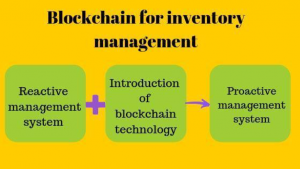Top 5 Use Cases of Blockchain in Supply Chain Management

Today, supply chain management is getting extremely complex and one of the major issues faced by the firms is the transparency and accuracy in the processes. To have a successful supply chain management, companies have to build an end-to-end, transparent and strong communication ecosystem. Because of the lack of transparency and complexity involved in the industry, companies are implementing blockchain into their supply chain operations.
Why blockchain is introduced to supply chain operations?
Blockchain can increase the transparency and efficiency of supply chain operations as blockchain is a digital ledger that records various transactions. These transactions are recorded in the form of blocks that are sequentially connected like a chain. Incorporating blockchain technology into the supply chain reduces paperwork and costs, enhances regulatory compliances, and prevents counterfeit activities.
According to a report on ‘Blockchain Market in Supply Chain- Forecast (2019-2025)’ released by IndustryARC, the blockchain market in the supply chain is expected to reach $524 million by 2024 during the forecast period of 2019-2024.
This blog discusses ‘Top 5 Use Cases of Blockchain in Supply Chain Management’ such as Food Safety, Smart Contracts, Finance, Inventory Management, and Traceability.
Food Safety
In the food industry, insufficient data and traceability issues result in wastage and subsequent loss in terms of cost. According to a report by NSF, fraudulent activities in the industry brings $49 billion loss in the food industry globally. Another report by the World Health Organization states that more than 4 lakh deaths are happening every year due to contaminated food. Adding to this, illegitimate production of food supplies also causes infectious diseases and money loss.
Manual record maintenance can lead to inaccurate updates and vulnerability, which makes it difficult to track the supply and thereby results in the delay of investigation. Blockchain can transform the food supply chain by tracking the movement of food and avoid delivering contaminated food to the end consumers.

Blockchain technology can support the food industry to maintain and track down the information related to the shipment quickly. This helps to understand the origin of food contamination and refill with new inventories to replace the unusable food supplies. The use of this technology will bring transparency to the supply chain management by linking the stakeholders such as farmers, logistics providers, retailers, auditors, and consumers.
Food supply giants like Unilever, Golden State Foods, Dole, Nestle, Walmart, etc., are currently experimenting with the possibilities of blockchain technology in supply chain management.
For example, Blockchain and IoT combination is tested to prevent fraudulent activities in the supply chain management of wine by OrginTrail in association with TagItSmart. In association with KPMG and IBM, Walmart and Merck also are testing blockchain to enhance the security and safety of drugs.
Smart Contracts
A smart contract with blockchain technology can be referred to as a software program used to carry out a digital contract powered by blockchain. Smart contracts with blockchain can be integrated into the supply chain industry for preventing any kind of fraudulent activities. Based on the programming, specific supply chain events are triggered automatically such as payment, serial number mismatch, etc.
Smart contracts incorporated with blockchain technology help to capture, validate and enforce the terms as agreed by the parties involved in the contract. Blockchain enables the agreements and transactions involved in the contract to be carried out without depending on a legal system or external enforcement. By using blockchain, the information in the contract will be recorded in the form of blocks that cannot be modified, deleted or lost.
For instance, HSBC banks and BofA Security in association with Infocomm Development Authority, Singapore used smart contracts to automate the trade deals between exporters and importers.
Finance
Finance in the supply chain management ecosystem consists of several enterprises, logistics companies, anchor corporations, and financial institutions. The primary source of finance is the financial institutions within the ecosystem. When a financial institution like a bank offers financing to the seller and charges credit management fees and discount fees.
Likewise, various methods are involved in supply chain financing with slight differences in the liabilities and processes. Based on the agreement between the financial institution and seller, the buyer defaults may or may not be taken care of by the financial institution.
The incorporation of blockchain technology will facilitate supply chain financial management. All parties involved in the financial agreement can access the financial records with the help of this technology but do not allow any deletion or alteration of the records. This builds trust between all the parties engaged in the agreement as the digital ledger is shared with all of them.
The technology also denies control to a single party enabling efficient and trustworthy supply chain finance management. It also allows to apply smart contracts and initiate immediate payment as soon as the delivery of the product occurred.
For e.g., Sichuan Heijia partnered with IBM to launch Yijian Blockchain Technology Application System, a blockchain-based pharmaceutical supply chain finance system that eliminates financing challenges in the pharma industry.
Inventory Management
The supply chain industry is facing issues in building the authenticity and accuracy associated with inventory management. Many of the inventory management tools and techniques are using age-old methods such as linear data entry and DBMS that may lead to negligence and wrong data entry. Inconsistency in inventory management results in data manipulations, laundering and other unethical practices.

Blockchain technology bridges the gap by offering transparency and security by resolving the current issues in inventory management. Blockchain in inventory management offers secured data entry, encryption of data, and decentralization of data, secured accessibility, data accuracy, and verification of data at each checkpoint.
For instance, BHP Billiton Group uses blockchain for recording and tracking data in the mining trade with the vendors.
Traceability
Traceability of goods is a must to run a reliable and successful business in any of the industries. It helps in mapping and improves the operational efficiency of supply chains. The traceability factor applies majorly to pharmaceuticals and food products that require robust shipping and storage requirements.
How does blockchain help in the traceability of products? Blockchain technology has the capability of solving any anomalies in the traceability of the products. Tracing the product lifecycle from the origin to the consumer enhances safety, creditability and efficiency.

The US Drug Supply Chain Security Act insisted on the traceability and tracking of pharmaceuticals to ensure secure movement of supply chain activities.
For e.g. Bumble Bee uses SAP’s blockchain technology to trace the journey of seafood from the deep blue sea to the plate.
Conclusion
The use of blockchain technology can bring a significant transformation in the supply chain industry by streamlining the workflow within the ecosystem. This technology helps to reduce cost, wastages, and downtime that is usually caused by manual handling.




